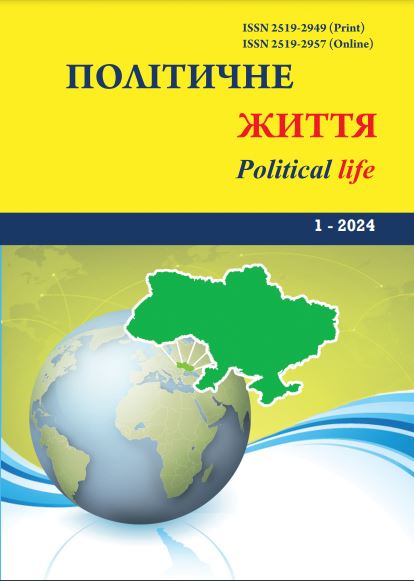Information aggression of the Russian Federation: challenges and overcome
DOI:
https://doi.org/10.31558/2519-2949.2024.1.16Keywords:
informational aggression; Ukraine; Russian Federation; humanitarian policy; resistance to challenges; propaganda; disinformationAbstract
This article examines the humanitarian policy of Ukraine as an important factor influencing informational aggression by the Russian Federation. The main principles, goals and strategies of humanitarian policy are described, which are used by Ukraine to support its national identity, develop culture and education, protect human rights and provide humanitarian aid.
Attention is drawn to how Ukraine uses humanitarian means and communication strategies
to form and assert its own discourse on Russian aggression, as well as to counter-act with Russia’s propaganda actions.
Various aspects of the use of information resources, social media and other online platforms as tools in Ukraine’s humanitarian policy are analyzed. The strengths and weaknesses of these tools are studied in order to determine the optimal ways of their effective use to resist Russian informational aggression.
Today’s reality is informational and hybrid war, during which trends arise that endanger the existence of not only social relations, but also the state and the whole world. Accordingly, information security in the conditions of the modern world takes a priority place among other threats. And it is with the help of the progressive development of the humanitarian sphere in state policy that it is possible to solve all kinds of threats directed against people, the state and the world.
The conclusions of the article make it clear that the humanitarian policy of Ukraine plays an important role in the context of the informational aggression of the Russian Federation. Further actions are recommended for the development of Ukraine’s humanitarian diplomacy strategies and communication tools to effectively influence the international community’s perception of the real conditions of Russian aggression, with the aim of ensuring the security and revival of the Ukrainian national sovereignty.
References
Бачення України: реформування та відновлення соціально-гуманітарної сфери у перспективі 2030 року. UAReform. URL: https://uareforms.org/reforms/Vision-of-Ukraine-2030
Булан Є. А., Панін І. Г. Європейський Союз та інформаційні впливи російської федерації. Донецький національний університет Національний університет у Вінниці, Україна. 2020. с. 31-34. URL: https://jvestnik-sss.donnu.edu.ua/article/view/8411/8410
Гуманітарна політика в Україні: виклики та перспективи (Біла книга) : аналіт. доп. / [Сінайко О. О. (кер. авт. кол.), Тищенко Ю. А., Каплан Ю. Б., Михайлова О. Ю., Валевський О. Л. та ін.] ; за заг. ред. Ю. Б. Каплан, Ю.А. Тищенко. Київ : НІСД, 2020. 126 с.
Зубченко С. Сучасні наукові підходи до аналізу гуманітарної політики в Україні. Стратегічні пріоритети. №1. 2010. – С.103-106.
Управління соціальним і гуманітарним розвитком: навчальний посібник. К: НАДУ. 2008. 290 с.
Gavin, J. Disinformation in the Russia-Ukraine war. Vision of Humanity. URL: https://www.visionofhumanity.org/information-and-misinformation-in-the-russia-ukraine-war
OECD. Disinformation and Russia’s war of aggression against Ukraine – OECD. URL: https:// www.oecd.org/ukraine-hub/policy-responses/disinformation-and-russia-s-war-of-aggression-againstukraine-37186bde/

